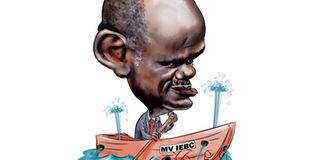Premium
The nine lives of Wafula Chebukati at troubled IEBC

What you need to know:
- But more than the mere position he holds, it is the drama that has been there between Mr Chebukati and the former CEO Ezra Chiloba that remains to define his entire time at IEBC.
- In June, there were reports that Chebukati had ordered that locks of Mr Chiloba’s office be changed and “travelled abroad” with the office keys to make sure the CEO does not access it.
- For his critics, Mr Chebukati runs IEBC like a personal property and wants to have the final say on everything.
Until his appointment to the position of chairman of the Independent Electoral and Boundaries Commission (IEBC) in early 2017, Wafula Wanyonyi Chebukati had largely operated behind the scenes in his legal profession.
The exception to this was in 2016 when he was the lawyer for former Ethics and Anti-Corruption Commission (EACC) chairman Philip Kinisu, who was fighting efforts by fellow commissioners and MPs to remove him over claims of conflict of interest.
But the IEBC job has thrust him into the limelight, much as he tries to avoid it. Save at press conferences and other media events, Mr Chebukati rarely engages with the media and one would be hard-pressed to point at any one-on-one interviews he has granted.
Even during press conferences, he keeps the engagements strictly to the script, trying as much as possible to avoid any pitfalls that could be erected on his way by the journalists’ questions.
DRAMA
But more than the mere position he holds, it is the drama that has been there between Mr Chebukati and the former CEO Ezra Chiloba that remains to define his entire time at IEBC.
Following the nullification of the August 2017 presidential election by the Supreme Court, Mr Chebukati immediately went on a war path. He revealed that they would be doing some internal changes in personnel, even as they prepared to conduct fresh polls in 60 days.
“For now we don’t know the reasons for invalidating elections, I would like the Supreme Court to issue its full judgement in time so that we can know the exact reasons and for us to streamline our process in line with that ruling,” said Chebukati.
Then started a stream of leaked internal memos, the CEO’s suspension that raised a storm and led to the resignation of three commissioners Connie Maina, Paul Kurgat and Margaret Mwachanya, numerous instances when confidential internal documents found their way to the press and the entire build up to the sacking of Mr Chiloba.
TRAVELLED ABROAD
In June, there were reports that the IEBC chairman had ordered that locks of Mr Chiloba’s office be changed and “travelled abroad” with the office keys to make sure the CEO does not access it. Mr Chebukati had laughed off the allegations. “It's just some coincidence that @wchebukati was away. He is the chairman, he does not carry any office keys. He is not the janitor,” IEBC responded to the claims.
Then a week or so before his eventual sacking, Mr Chiloba’s official drivers and security aides were withdrawn. There was also an attempt to take back the vehicles that were assigned to the CEO. That however did not pass until after Mr Chiloba was sacked.
The fallout with Mr Chiloba and subsequent court battles exposed something else about the way IEBC was being run: everything was done through memos, some even as simple as reminding another person of something.
PERSONAL PROPERTY
For his critics, Mr Chebukati runs IEBC like a personal property and wants to have the final say on everything.
Former commissioners Ms Maina, Ms Mwachanya and Dr Kurgat said in the joint resignation statement, “The commission boardroom has become a venue for peddling misinformation, grounds for brewing mistrust, and a space for scrambling for and chasing individual glory and credit.”
Despite all the criticisms from his former colleagues and political actors, much to the annoyance of faultfinders, Mr Chebukati has soldiered on, going past a potential minefield that was deliberately placed on his way by the resignations of three commissioners at once.
He has had a High Court ruling that affirmed his position that even with three commissioners, IEBC is properly constituted to run the commission.




